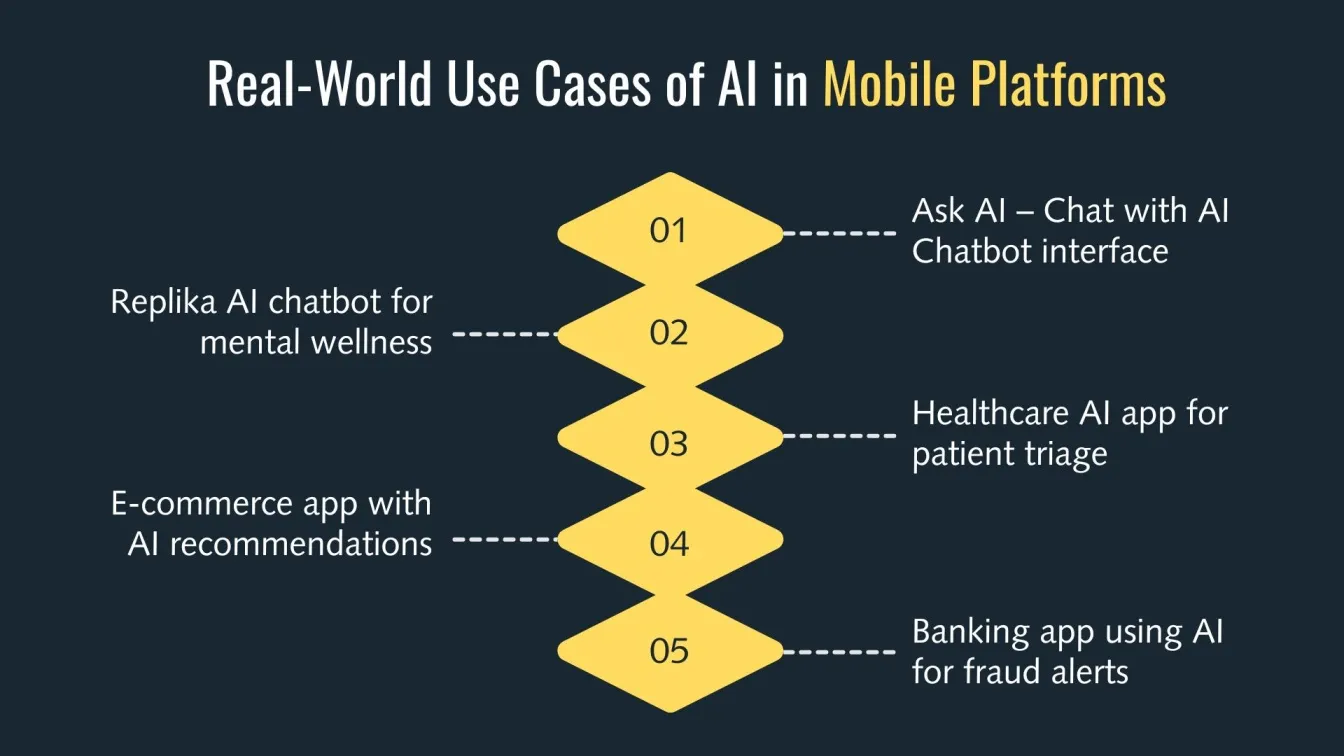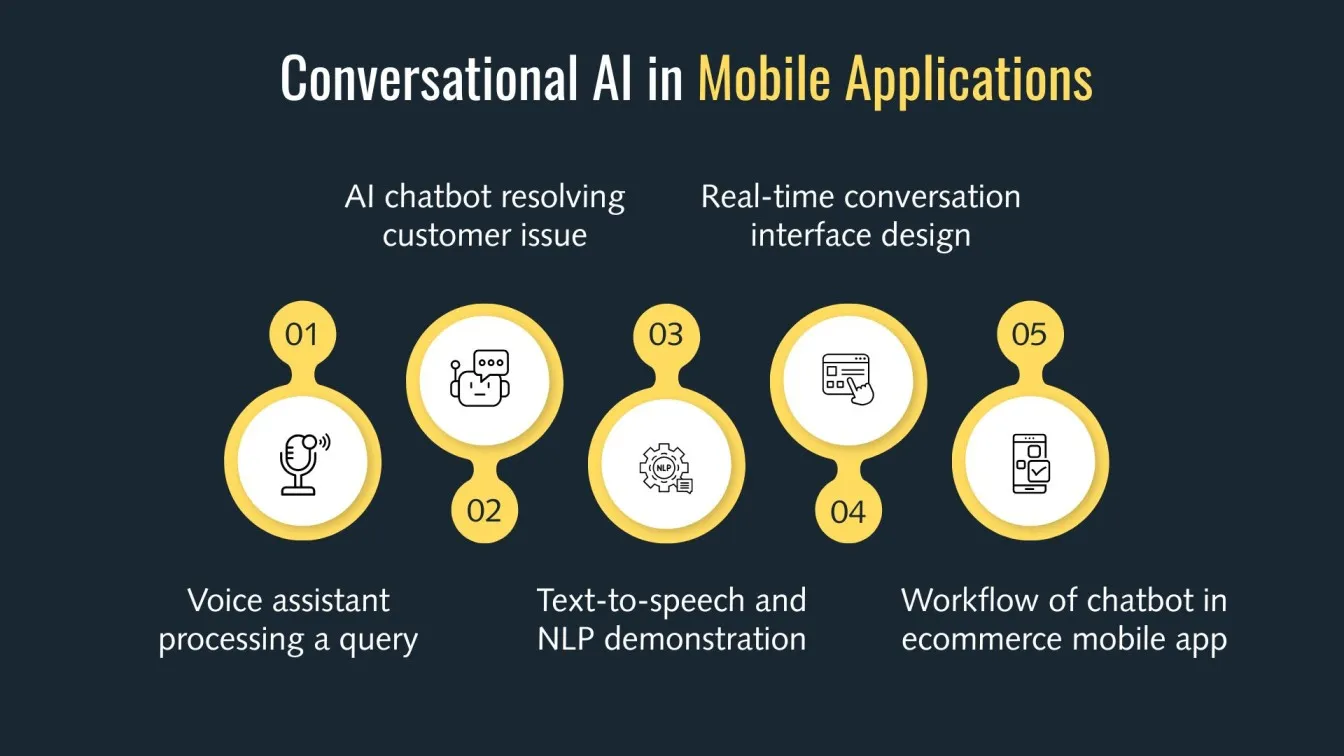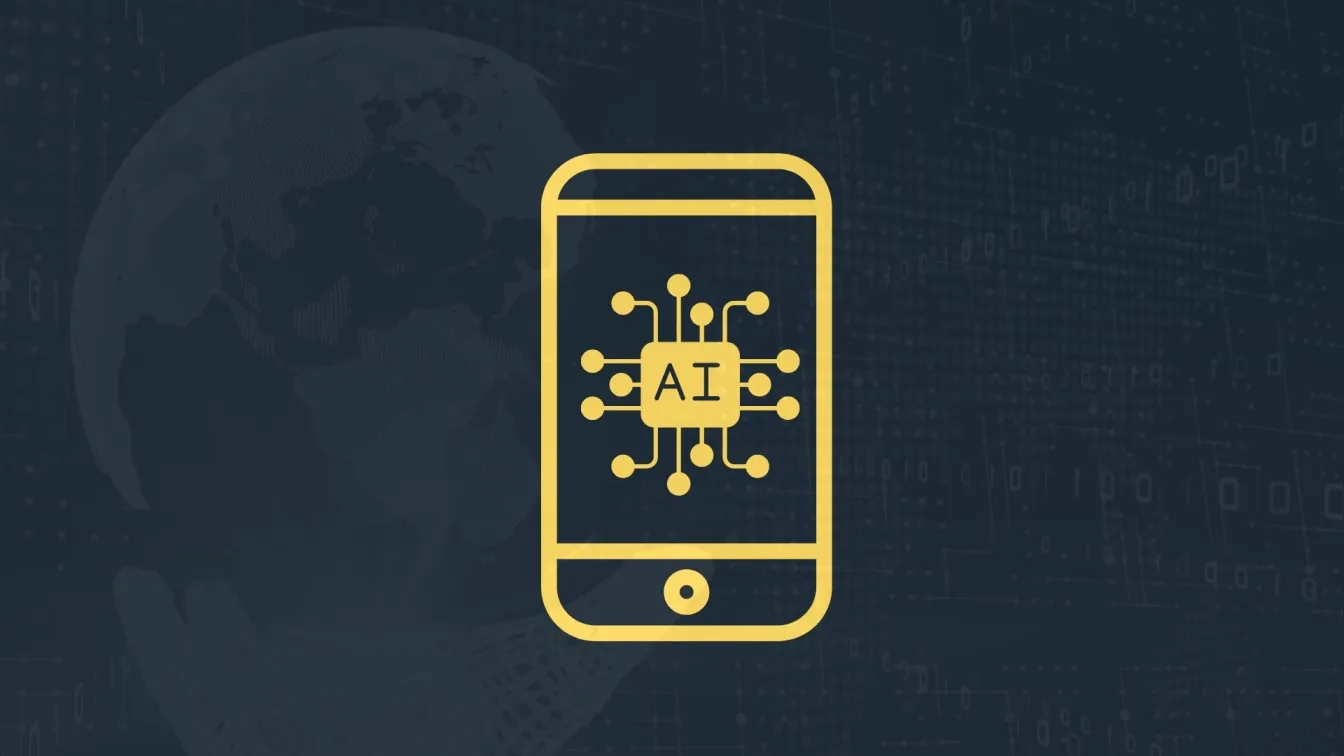AI is dramatically transforming how we design, build, and experience mobile applications. By automating repetitive tasks, offering real-time insights, and enabling personalized experiences, AI is now a core component of modern mobile app development. Whether you're building for iOS, Android, or using cross platform mobile app development services, integrating AI-powered tools is essential for enhancing user engagement, efficiency, and customer satisfaction.
What’s coming up? Keep scrolling to explore:
🚀 What is artificial intelligence (AI) in mobile app development, and how is it changing the market?
🚀 Key technologies that power top AI apps and mobile intelligence
🚀 Real-world examples of popular AI apps for Android and iOS platforms
🚀 How AI improves UI/UX design, performance, and real-time personalization
🚀 Voice assistants, AI chatbot development, app security, analytics & more
🚀 AI-driven insights for business, sales, SEO, and customer experience
What Is AI in Mobile App Development?
AI in mobile app development refers to the integration of artificial intelligence technologies like machine learning, natural language processing (NLP), computer vision, generative AI, and neural networks into mobile applications. These tools allow apps to make intelligent decisions, learn from data, and perform tasks that once required human intervention. With the use of best AI tools for business, mobile apps can provide more personalized and efficient experiences, enhancing user engagement and optimizing business processes.

Why AI Matters for Today’s Mobile Applications
AI enables mobile apps to:
- Analyze user behavior for personalized experiences
- Automate everyday tasks like notifications, reminders, and messages
- Deliver real-time updates and interactions
- Enhance customer engagement and user satisfaction
- Improve mobile app performance through predictive modeling
Modern mobile app developers rely on AI to power apps that are smarter, more intuitive, and capable of adapting to the user's preferences and context. Businesses use AI to reduce costs, improve customer service, and streamline user journeys.
Key Technologies Behind AI in Apps
To build effective AI-powered apps, developers use a combination of technologies, frameworks, and cloud solutions:
- Machine Learning (ML): Enables the app to recognize patterns in data and improve predictions over time.
- Natural Language Processing (NLP): Powers AI chatbot development, speech-to-text conversion, and semantic search.
- Computer Vision: Enables features like facial recognition, document scanning, image tagging, and augmented reality.
- Generative AI: Used for real-time content creation including images, text, audio, and video, especially for social media posts.
- Cloud-Based AI Tools: Mobile developers can access infrastructure, scalability, and APIs from platforms such as Azure AI Search, Google Cloud AI, and Azure Machine Learning.
In order to facilitate more intelligent user interfaces, improved automation, and enhanced performance, these technologies, including best generative AI tools, are integrated into different phases of mobile app development.
1const vision = require('@google-cloud/vision')
2const client = new vision. ImageAnnotatorClient();
3const [result] = await client.labelDetection('image.jpg');
4const labels = result.labelAnnotations;
5Mabels.forEach(label => console.log(label.description))Top Real-World Examples of AI-Powered Mobile Apps
AI is already making waves across industries. Let’s look at how real apps use AI:

- Ask AI – Chat with AI Chatbot: A conversational AI chatbot app using generative AI for interactive and intuitive responses.
- Replika: A wellness app that provides companionship and emotional support through an AI companion.
- AI apps for Android and AI apps for iPhone in eCommerce: Apps use AI to recommend products, auto-complete searches, and offer AI chatbot for ecommerce support.
- Healthcare mobile app development: AI is used to enhance patient care, triage, appointment scheduling, and even clinical trials.
- Banking apps: Leverage AI for fraudulent transaction detection and security alerts in real time.
How AI Enhances User Experience in Mobile Applications
One of AI's most important contributions to mobile app development is its potential to greatly improve the user experience (UX). By analyzing user behavior in real time, AI enables mobile apps to be more intuitive, adaptive, and personalized.
Here's how AI enhances UX in mobile apps:
- Delivers real-time suggestions based on user preferences, location, and in-app actions, allowing AI-powered apps to feel more responsive and proactive.
- Learns from user behavior to create adaptive user interfaces, ensuring accessibility and usability for different user needs, especially across cross platform mobile app development.
- Minimizes friction in user journeys by predicting the next steps, offering shortcuts, and reducing the number of taps or inputs needed to complete a task, a key factor in improving customer satisfaction.
- Supports mobile app design that evolves over time, offering a personalized experience based on each user's history and usage patterns.
- Integrates voice assistants and AI chatbot apps to assist with navigation, reminders, and FAQs, making everyday interactions smoother and faster.
- Empowers mobile app developers to deliver user-centric designs that align closely with real-world usage patterns gathered from mobile app analytics and AI-powered tools.
AI creates a dynamic, learning-driven environment out of the conventional static user interface. Whether it’s apps that use AI for Android, iOS mobile app development, or even hybrid mobile app development, the ability to deliver real-time updates and adjust to user behavior is critical for long-term user engagement and retention.
Companies leveraging AI tools for business are already seeing better app performance metrics — higher session times, increased conversions, and deeper customer engagement.
Widget build(BuildContext context) {
return userPrefers DarkMode ? Dark ThemeWidget(): LightThemeWidget();AI for App Personalization and Recommendation Systems
Personalization has become a must-have in modern mobile app development, and AI-powered apps lead the way by delivering tailored user experiences based on real-time data.
- AI analyzes user behavior to customize app content, layout, and product suggestions.
- Predictive recommendation engines suggest relevant items, content, or features before the user even searches.
- Smart notifications are sent based on behavioral patterns, improving customer engagement and reducing churn.
Industries like retail, finance, education, and healthcare use AI tools to increase customer satisfaction, drive conversions, and create a more personalized experience. With tools like Azure AI Search, Google Cloud AI, and ChatGPT, even flutter or cross platform mobile app development can easily support dynamic, intelligent recommendations.
Voice Assistants and Chatbots in Mobile Apps
Modern AI-powered apps are expected to communicate as naturally as humans — and that's where voice assistants and AI chatbots shine.
- Generative AI chatbot apps deliver contextual, human-like responses to improve support and interaction.
- AI chatbot development streamlines FAQs, live chat, and customer service workflows with real-time, automated replies.
- Voice assistants enable users to perform tasks hands-free, enhancing user experience and accessibility.
- Businesses use AI tools for business to automate scheduling, note-taking, and reminders within mobile apps.
- In ecommerce, AI chatbot apps drive customer engagement, resolve queries instantly, and reduce the need for human agents.
Whether in iOS, Android, or cross platform mobile app development, integrating chat and voice AI improves app usability and boosts customer satisfaction.

Improving App Security with Artificial Intelligence
As mobile threats grow more complex, integrating AI into mobile app security has become a must for safeguarding sensitive user data and preventing fraud.
- AI detects fraudulent transactions by analyzing user behavior, device patterns, and geolocation in real time.
- It leverages computer vision for secure biometric logins — like facial, iris, or gesture recognition — reducing reliance on passwords.
- AI strengthens mobile app security testing by identifying threats early, automating risk detection, and responding faster to anomalies.
This level of intelligent protection is crucial in banking, healthcare mobile app development, and enterprise platforms, where data privacy and user trust are paramount. Using AI tools like Azure Machine Learning and Google Cloud AI, mobile app developers can deliver safer, more resilient applications.
AI in Mobile App Analytics and Performance Tracking
AI plays a vital role in turning raw data into actionable intelligence within modern mobile app development.
- It tracks user behavior through events, heatmaps, and flows across AI apps for Android, iOS, and cross platform mobile app development.
- Delivers real-time feedback on crashes, slowdowns, and feature usage, improving mobile app testing and overall performance.
- Supports A/B testing, churn prediction, and customer service optimization by learning from interaction patterns.
- Tools like Google Cloud AI, Azure Machine Learning, and AI tools like ChatGPT help mobile app developers reduce time-consuming tasks and improve user experience.
Whether for healthcare mobile app development or ecommerce, AI helps analyze vast amounts of data, deliver real-time updates, and enhance customer satisfaction with minimal human intervention.
{
"event":
"signup_click",
"user":
"abc123",
"time":
"2025-04-21T10:017",
"screen":
"Signup Page"
}Steps to Integrate AI into Your Mobile App
Integrating AI into your mobile app can significantly enhance user experience, boost performance, and automate routine tasks. Whether you're building a new product or upgrading an existing one, following the right approach ensures success across native, flutter, and cross platform mobile app development.
Here’s a streamlined step-by-step process:
- Identify your goals: Define the AI use case — such as an AI chatbot, voice assistant, personalization engine, or real-time analytics.
- Select the right tools: Choose from Google Cloud AI, Azure Machine Learning, AI tools like ChatGPT, or other trusted AI development tools.
- Collect and prepare training data: Use user behavior data gathered from mobile app analytics or existing usage logs.
- Develop or integrate AI models: Use APIs, SDKs, or frameworks to embed models into your app across different platforms.
- Test thoroughly: Conduct mobile app testing and mobile app security testing to validate performance, accuracy, and reliability.
- Deploy at scale: Roll out your AI-powered app on platforms like flutter, hybrid, or native mobile app development frameworks with support from cross platform mobile app development services.
These steps ensure your app benefits from AI-powered tools while maintaining speed, security, and adaptability for real-world usage across industries — from ecommerce to healthcare mobile app development.
Challenges of Using AI in Mobile App Development
While AI brings powerful benefits to mobile app development, it also comes with a few challenges:
- Requires high resources like battery, memory, and compute power — especially for real-time processing in AI-powered apps.
- Needs vast amounts of clean, labeled data based on user behavior for accurate predictions.
- Raises concerns around bias, transparency, and ethical use — particularly in AI chatbot development.
- Can be complex to implement across cross platform mobile app development or hybrid mobile app development environments.
To overcome these, mobile app developers must use reliable AI development tools, ensure secure data handling, and follow best practices in design and testing.
Future Trends of AI in Mobile Applications
AI's role in mobile app development is changing quickly as new developments create more intelligent and self-governing app experiences.
- Generative AI apps will power real-time creation of visuals, speech, and interactive content across AI apps for Android and iOS.
- AI productivity tools will be deeply integrated to streamline routine tasks, scheduling, and document handling.
- AI tools for sales will use behavioral scoring and voice analysis to target potential customers more effectively.
- SEO AI tools will support marketing teams with smart dashboards built directly into mobile interfaces.
- AI apps for business will continue optimizing supply chain operations, workflows, and decision-making.
Regions like Latin America, Southeast Asia, and Africa are expected to lead the next wave of AI-powered app adoption due to rising demand for automation and smarter customer experience solutions.
RECAP
To summarize:
- AI empowers mobile apps to deliver a personalized experience, automate routine tasks, and understand user behavior in real time.
- Tools like Azure AI Search, Google Cloud AI, and Azure Machine Learning enable scalable integration using advanced AI development tools.
- Whether in healthcare mobile app development, ecommerce, or productivity apps, AI is transforming how users engage with technology.
- These features are applicable to cross-platform mobile app development services, Flutter mobile app development, and iOS mobile app development.
Looking to future-proof your mobile strategy?
Partner with BuildNexTech to test, secure, and launch your next-gen AI-powered app — built for performance, user satisfaction, and business impact.
People Also Ask
What is the difference between AI and machine learning in mobile app development?
Machine learning is a subtype of artificial intelligence (AI) that allows apps to learn from data, even if AI encompasses the more general idea of intelligent behavior. ML powers many AI features like recommendation engines and chatbots in mobile app development.
Can AI be added to an existing mobile app or only during development?
AI can be added to both new and existing mobile apps using APIs and SDKs from tools like Google Cloud AI or Azure AI Search. It's ideal for enhancing features like chatbots, voice search, and personalization.
Is AI useful for small-scale or startup mobile apps?
Yes, AI is highly effective for startups. It helps automate customer service, deliver a personalized experience, and optimize user engagement using affordable AI tools for business.
Which programming languages are best for building AI mobile apps?
For AI applications, Python, Java, and Kotlin are the best choices. For cross-platform, use Flutter with TensorFlow Lite or integrate cloud-based AI development tools in your preferred tech stack



























.webp)
.webp)
.webp)

